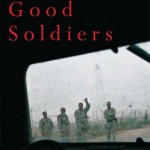
Continuing my series on writers I knew way back when and have embarrassing pictures of, today I’ll focus on Joel Achenbach, and the secrets of writing humor.
I first met Joel when I moved to Miami to work as associate editor at the Miami Herald’s Tropic Magazine. Gene Weingarten , the editor (believe it or not) who hired me, suggested that if I needed a place to live, there was this very bright young writer at the paper who was looking for someone to share a house in Coconut Grove.
The house, on a palm-lined street just a block off the very funky main drag, was perfect, and so was the rent. But Joel hesitated. “You sure an old dude like you really can handle living with a young buck like myself?” he asked.
I was all of 30. Joel was 24.
I admit there may have been an initial maturity differential. My reaction, when I first stepped into the shared bathroom and noticed that the black bathtub was actually made of white porcelain, was to buy a can of Comet and a scouring pad to scrub it white (or at least gray) again. Joel considered this an act of aggression, a violation of his personal code, and made it clear that no more grownup-type behavior would be tolerated. So I rapidly regressed, and the house devolved into a college dorm, with random friends decamping on the living room couch, violent wiffle ball games in the front hall at all hours and parties so loud that they shook the glass storefront of the 7-11 two blocks away — where I had gone at 2 a.m. for more beer.
We got along fine.
And I soon realized that his horror at a clean tub was 90 percent schtick. (The 10 percent consisting of genuine horror is a blog for another day). This was the inception of what would become a continuing commentary on the boy-man lifestyle, which he would raise to art in a series of columns he wrote about what he called “the Loser Patrol” and much later, all his discussion of man-caves and “porch season” in his inimitable “Achenblog” on the Post website.
Consider this recent Achenblog posting:
Two Guys With Much in Common
It occurs to me that Barack Obama and I have a lot in common. We’re both 48. We both live in Washington, D.C. We both have school-age daughters. And we both have lots of things to worry about.
Like, I need to get the firepit ready for the winter season. I need to chop some wood. I need to get the bikes tuned up. I need to wash my car. I probably need to do some “work” at my “job,” but obviously that’s in the Optional category. I need a haircut.
So already you see it’s a full plate by any measure, bordering on the undoable. But a man must have strength. Shoulder the burden, keep marching ahead. Gut-check time.
Obama, meanwhile, has to focus on Afghanistan, where our troops are facing increasingly deadly attacks even as we prop up an obviously corrupt government. He has to do something about Iran, which is trying to go nuclear. He has to deal with Iraq, which could descend into chaos again as the troops withdraw. He has North Korea, Venezuela, Cuba and various other dyspeptic regimes led by dictators doing whatever they can to resemble lunatics. He has to figure out how to save the planet from global warming. He has to guide a health-care bill into law through a gauntlet of conservative fury and liberal dissatisfaction. He must run a government that is, let’s see, about $11 trillion in debt, give or take a trillion. He has to worry about an economy in which the unemployment rate is 9.8 percent. Plus, he has to be concerned about all the secret stuff that the scary briefers tell him every morning, like wire intercepts suggesting that the bad guys are developing airborne pathogens that can give everyone the hiccups (hypothetical — do not panic).
So, you see, there’s just a lot we have in common.
Wait, did I mention the weeding I need to do? The mere thought of it nearly crushes my spirit. This is why I need staffers!
There are so many sophisticated humor strategies going on here it would take pages to deconstruct them all. (WARNING: It’s never pretty to attempt to dissect humor. But it can be helpful if you are trying to be funny in writing to observe a master at work.)
Here we go: Everyone loves to see a clown take a pratfall, as Joel is doing here, pretending to equate his petty slacker concerns with the concerns of the Leader of the Free World. Putting ‘my “work”‘ and ‘my “job”‘ in quotation marks, and sandwiching that “optional” concern between washing his car and getting a haircut. Asserting that all his inane chores are “bordering on the undoable.”
But there’s more going on here than self-deprecation. As in all of the finest humor, the engine is keen observation of an obscured truth. And that is, beneath all the weightiness of our formal functions in society, for most of us at least, the small, private world of back yards and fire pits looms large, even in comparison to the serious work of the world.
And then there’s the observed truth of his summary of the world situation — which has a great double whammy of at first sounding like pure hyperbole, until you think about it and realize it’s a little too close to being accurate. My favorite example of this: “He has North Korea, Venezuela, Cuba and various other dyspeptic regimes led by dictators doing whatever they can to resemble lunatics.”
And finally, there’s Joel’s ability to accomplish two things at once. By necessity of compression, any sentence in good writing has to serve more than a single purpose. In the following example, Joel both manages to raise his already absurd argument to an even higher plane of absurdity and bring the comparison of his life to Obama’s full circle. Right after completing the summary of the President’s multiple headaches, ending with the fear of biological warfare, he comes back to his own concerns, and as if he’s made the case that they are the equal of Obama’s, he jumps to the next illogical conclusion, which reinforces his buffoonish sense of entitlement:
Wait, did I mention the weeding I need to do? The mere thought of it nearly crushes my spirit. This is why I need staffers!
If someone can write that well, I say give him a pass for a dirty bathtub.

 Let me be direct. “The Good Soldiers” by David Finkel (Sarah Crichton Books/FSG) is the most honest, most painful, and most brilliantly rendered account of modern war I’ve ever read. I got no exercise at all the day I gulped down its 284 riveting pages.
Let me be direct. “The Good Soldiers” by David Finkel (Sarah Crichton Books/FSG) is the most honest, most painful, and most brilliantly rendered account of modern war I’ve ever read. I got no exercise at all the day I gulped down its 284 riveting pages.